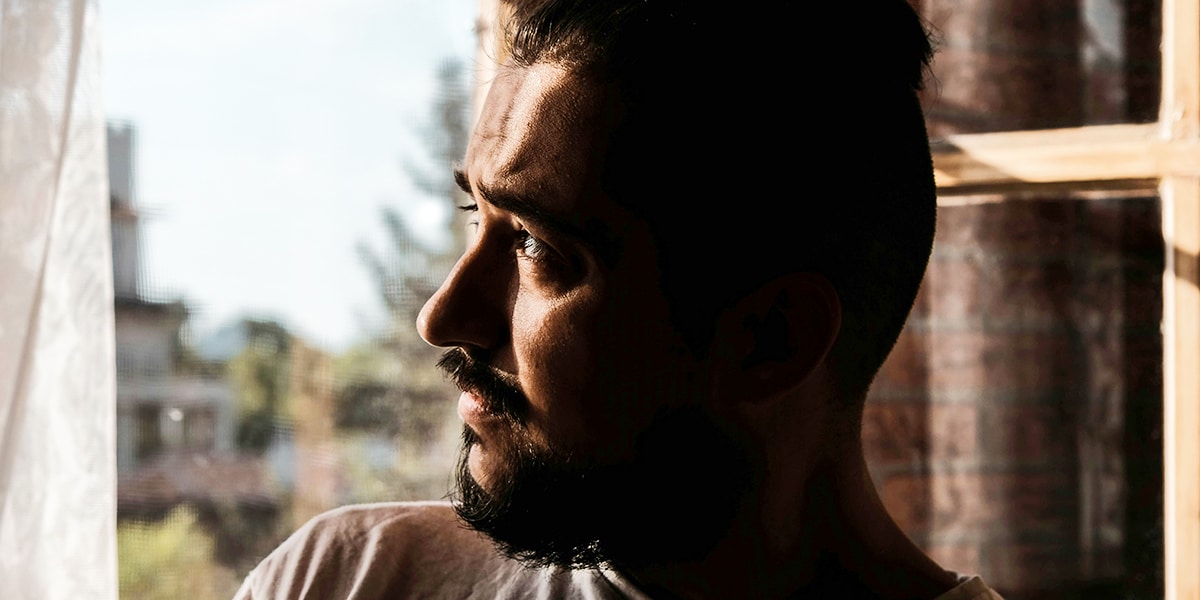Ever felt lost on your spiritual journey? Many people have—even in the Bible. A very wealthy young man runs to Jesus, kneels at his feet and asks him: “Good teacher, what must I do to inherit eternal life?” (Mk 10:17). After this eager inquirer asserts that he has faithfully kept God’s commands all his life, Jesus lovingly invites him to a deeper level of discipleship—along with a promise that he will find treasure in heaven—after selling his possessions. When the young man hears this, he walks away sad because he refuses to give up his many possessions.
As compelling as this story is, we may also find it helpful to recall that Mark describes this young man as running to ask his question. This story can prompt us to question the pace and direction of our own spiritual journeys: How eagerly do we approach Jesus? Do we run to him? Or does fear hold us back?
Do we approach Jesus with hesitations and doubt? Or do we take our questions and concerns elsewhere? Don’t we daily seek direction and guidance? While driving short or long distances, many of us rely on GPS. We implicitly trust that the GPS will quickly and safely guide us to our destination.
Is there a similarly reliable guidance system for our spiritual lives and our relationship with Jesus? Alice, a 33-year-old working mother of two small boys, recently shared: “How do I have time to pray and find God? I am so busy with my two children, and it’s much easier for me to pray at Christmas or Easter since I enjoy these seasons with my children, family members, friends and co-workers. But what about the in-between times when I often feel rather adrift, without a clear spiritual focus?”
What Alice calls “in-between times” the Christian liturgical year names “Ordinary Time,” the liturgical period between Christmas and Lent and again from Pentecost to Advent. Alice is asking the same question as many contemporary spiritual seekers: How can we more actively and securely follow Jesus’ guidance amid our daily tasks?
Using Gospel passages and reflection questions, this article will offer five pathways for spiritual journeys: encounter, trust, faith, freedom and community.
A Personal Response
“But who do you say that I am?”
(Mt 16:15)
Maurice, a 23-year-old college graduate, is struggling to launch his marketing and advertising career. Having crafted his résumé to showcase his newly honed skills, he finally admits that he doesn’t know how to talk about himself any more creatively. “Who am I?” he asks. “How do I let others know of my talents when I have so little experience in this competitive field? If only someone would take the time to get to know me and to give me a chance! If only I could meet the right person to help me get started in my career! I need assurance from God that I’ve made the right life choice after all of my years of education.”
Maurice is not alone as he seeks confirmation from God that he has discerned his life’s work well enough; many of us desire certainty that we are following the right path. The moving encounter between Peter and Jesus at Caesarea Philippi (Matthew 16:13-20) may help us reflect on our spiritual identity, who we are and who Christ is for us personally.
Note the persistence and urgency in Jesus’ question to Peter, “But who do you say that I am?” (v. 15). Peter’s heartfelt naming of Jesus as the Messiah, the Son of the living God, prompts Jesus to call Peter “blessed.”
Doesn’t Jesus ask each one of us, “Who do you say that I am?” Have we ever considered that Jesus desires a personal response from us as much as he did from Peter? How do we call upon Christ? How does Christ call to each of us in our everyday lives? We too seek the consolation of knowing that we are individually blessed and affirmed by Christ.
Open to Trust
“Do not worry about your life.”
(Mt 6:25a)
Nellie, a 68-year-old grandmother, is very concerned about her financial security because her retirement savings have declined significantly since 2008. She admits she’s been worrying about everything important to her. “I don’t want to be a burden on my children and grandchildren, in particular, since they all have their own lives to worry about. I thought that I had provided well enough for myself; now I realize, however, that I may not have enough for my golden years. What shall I do? How do I find peace of mind during these challenging times?”
In reading Matthew 6:25-34, a passage filled with images of natural beauty, we and Nellie encounter Jesus pointing to the nourished birds of the air, carefully clothed grass in the field and gloriously dressed wildflowers as a way to foster deep trust in God’s loving providence. While stressing the priority of the Kingdom of God before all else, Jesus clearly tells us that nature’s beauties can teach us a great deal. We can ask ourselves: Do we really desire to believe Jesus when he assures us that we need not worry?
How well we know which concerns and worries can consume us! Does our beautiful world invite us to trust more deeply in God’s personal care for us? How does Jesus care for us in daily life?
No Longer Afraid
“Do not be afraid; just have faith….”
(Lk 8:50)
As a 42-year-old, Roger sees his life as a treadmill of overwork. He notices that he cannot stop as he goes from one thing to another. “I wish that I could take time to enjoy my family and friends more; there is so much to do, however, and I want to provide well enough for my family, especially in these difficult economic times. But I’m afraid that this pace of work is killing me, really. And I don’t know what to do about it. Does God indeed want me to work this hard?”

Let us hear and believe Jesus’ ultimate promise:
“Behold, I am with you always,
until the end of the age.”
The Gospel story in which Jesus heals the daughter of Jairus (Luke 8:40-42,49- 56) presents another father trying to provide for his loved ones. Jairus loves his 12-year-old daughter so much that even the skeptical crowd’s ridicule does not keep him from showing faith in Jesus. How might we need to let go of our fears and give these to God so that we can truly believe—not because of what others have told us, but because we have experienced God’s reassurance in ways that exceeded our wildest imaginings!
As Jesus takes Jairus’s daughter by the hand, his words to the synagogue official are realized: “Do not be afraid; just have faith…” (v. 50).
How might our own pathway to faith, our journey, be enriched by placing ourselves within this story? Are we like the crowd? Do we resemble Jairus more? Or do we need some kind of healing as Jairus’s daughter did? As we ponder this passage, we might ask: Of what or of whom are we afraid? Do we share these fears with God? Do we believe that God can release us from these fears? How is Jesus increasing our faith even as he desires our wholeness?
Finding Freedom
“Take away the stone.”
(Jn 11:39a)
Julie, a successful and effective clinical therapist, has spent 30 years working to help others free themselves from compulsions, addictions and whatever blocks inner freedom and joy. She, however, cannot dislodge her “heavy stone” of resentment and not forgiving her father, who abandoned her as a child.
After years of intense counseling, Julie claims that nothing has worked for her and then asserts: “I can’t forgive my father for leaving us. He never even called or sent money to my mother to help take care of us. He just left. And here I am holding all this anger and rage within me like a heavy weight. What else can I do? Ironically, although I help others on their journey to be free, I can’t seem to free myself from this burden!”
The story of the raising of Lazarus in John 11:1-44 reminds Julie and each of us that heaviness in our hearts and souls can prevent us from experiencing the fullness of God’s presence. This dramatic Gospel scene opens with a message to Jesus from Mary and Martha that their brother Lazarus, the one whom Jesus loves, is ill. Since Lazarus died four days before Jesus arrives, he allows himself to be led to the tomb and then commands, “Take away the stone” (v. 39a).
Despite the crowd’s obvious skepticism, Jesus loudly bids Lazarus to leave the tomb. When Lazarus appears fully bound, Jesus directs that Lazarus be untied and set free.
Reflecting on this narrative may lead us to ask: How might we identify some of the stones and bindings that hinder our inner freedom as we seek God in daily life? Do we, like Lazarus, need assistance to become truly free? How does Jesus love us even as we deal with what hinders our interior freedom? How might we ask Jesus to remove what prevents our going free?
Lost and Found
“Where two or three are gathered together in my name, there am I in the midst of them.”
(Mt 18:20)
Jeanne-Marie lost all contact with eight family members in earthquake-ravaged Haiti. Now she struggles to understand how she can go on in the face of this tragedy.
She says: “I feel so alone and I don’t know where to turn. Do I go back to Haiti and search for them? Do I trust that I will be notified when more information is available? So often, my prayers feel empty when I pray alone. I really do need the support of others right now. Who can help me?”
The story in Matthew 18:19-20 can offer heartfelt consolation to Jeanne-Marie and everyone who needs assurance that God is indeed present as we gather with others. We do not make our life journey alone. The gift of community is essential because joining with even one other person can reaffirm that Jesus is already present in our midst (v. 20).
This kind of spiritual accompaniment can occur within families, prayer groups, parishes and support groups—as well as with sponsors, spiritual directors, pastors, friends or mentors.
Do we welcome others on our spiritual pathways? Or do we try to make our way alone? Do we realize and value how much others may rely on us? Do we believe that Christ is truly present in everyone with whom we share life and prayer? Do we gather with them in our prayer and spiritual seeking? What might we pray for in God’s name? What do we sense is God’s response?
Our Journey Continues
Often we find ourselves at a crossroads in our spiritual journey, needing guidance and assurance that we are following the right path.
As we seek to follow Jesus in our own “ordinary time,” we know that the Gospels offer abundant and varied stories to help us realize where Jesus is leading us. As we follow him more closely, the pathways experienced through encounter, trust, faith, freedom and community can assure us that even ordinary days are times when extraordinary grace can unfold, as the Gospels affirm.
We know the rich young man, Peter, Jairus’s daughter and Lazarus only because the Gospels describe their transformative encounters with Jesus. Might these Gospel witnesses encourage us to seek extraordinary graces from Christ as we follow their example and journey through ordinary days?
Since we know that Jesus identifies himself as “the way and the truth and the life” (John 14:6a), and if we are looking for a reliable spiritual GPS, could we have a more secure guide than Jesus himself? Can we pray to trust Jesus as he assures us that he is our way as we seek his guidance and strength amid life’s joys, sorrows, challenges and detours?
As we notice where our hearts are most deeply drawn while pondering our life’s direction, we may be able to hear and believe Jesus’ ultimate promise: “Behold, I am with you always, until the end of the age” (Matthew 28:20b).







